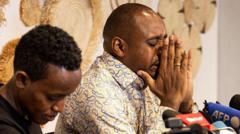In recent developments, Tanzania’s Information Minister Jerry Silaa announced a government ban on the social media platform X due to its alleged sharing of pornographic content, which he deemed inconsistent with the nation's laws and cultural values. This announcement comes at a time of heightened political tension as the country prepares for presidential and parliamentary elections, leading various human rights groups to express concerns over government censorship and repression.
Tanzania Blocks X Amid Rising Political Tensions

Tanzania Blocks X Amid Rising Political Tensions
Tanzania's government takes action against the social media platform X, citing concerns over pornography and rising political suppression.
As access to X has been restricted for the last two weeks amid political unrest, activists have pointed to a worrying trend of digital censorship that harkens back to the 2020 elections when the same platform faced shutdowns. Rights organizations, including the Legal and Human Rights Centre (LHRC), argue that the government's actions threaten the openness of Tanzania's digital landscape, especially as officials continue to utilize X for communication. Silaa has linked the ban to the platform’s decision last year to allow the distribution of adult content, stating that the explicit nature of some content violates Tanzania’s online ethical standards.
On May 20, net monitoring organization NetBlocks reported that the ban intensified following a police account hacking incident that showcased pornographic content, falsely announcing the death of President Samia Suluhu Hassan. The hacking coincided with a government crackdown on regional activists who were supporting opposition leader Tundu Lissu facing treason charges. While some activists were allowed entry into Tanzania, others faced detention and allegations of torture and sexual abuse, prompting calls from regional and international groups for inquiries into the human rights violations.
President Hassan's government claims to be upholding democracy, insisting that the upcoming elections will be free and fair. However, critics argue that her administration exhibits the same authoritarian tactics as her predecessor, John Magufuli. As tensions build ahead of the elections and with increasing reports of abuse against activists, the international community is closely watching Tanzania's approach to dissent and digital freedom.
On May 20, net monitoring organization NetBlocks reported that the ban intensified following a police account hacking incident that showcased pornographic content, falsely announcing the death of President Samia Suluhu Hassan. The hacking coincided with a government crackdown on regional activists who were supporting opposition leader Tundu Lissu facing treason charges. While some activists were allowed entry into Tanzania, others faced detention and allegations of torture and sexual abuse, prompting calls from regional and international groups for inquiries into the human rights violations.
President Hassan's government claims to be upholding democracy, insisting that the upcoming elections will be free and fair. However, critics argue that her administration exhibits the same authoritarian tactics as her predecessor, John Magufuli. As tensions build ahead of the elections and with increasing reports of abuse against activists, the international community is closely watching Tanzania's approach to dissent and digital freedom.



















